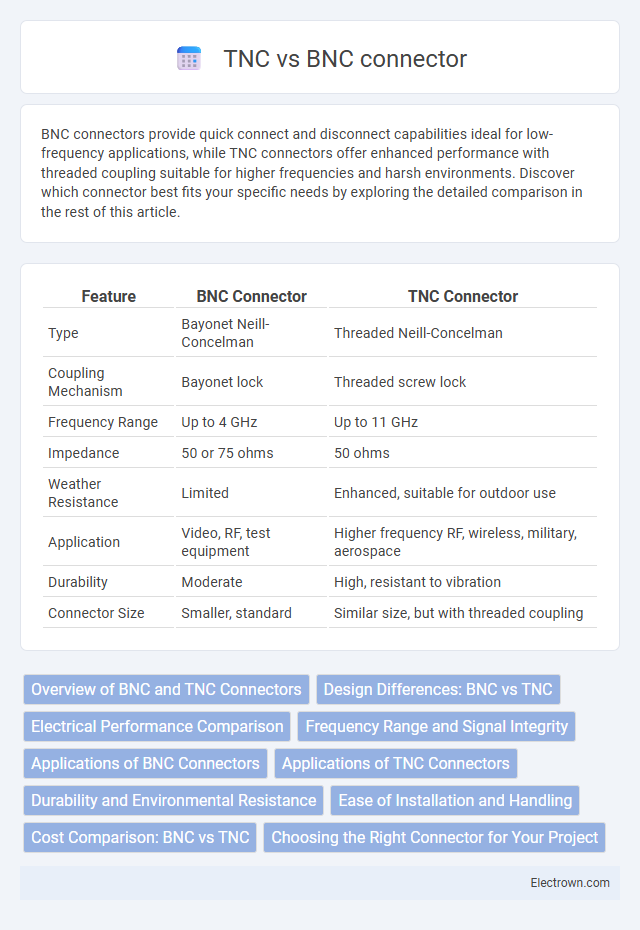BNC connectors provide quick connect and disconnect capabilities ideal for low-frequency applications, while TNC connectors offer enhanced performance with threaded coupling suitable for higher frequencies and harsh environments. Discover which connector best fits your specific needs by exploring the detailed comparison in the rest of this article.
Table of Comparison
| Feature | BNC Connector | TNC Connector |
|---|---|---|
| Type | Bayonet Neill-Concelman | Threaded Neill-Concelman |
| Coupling Mechanism | Bayonet lock | Threaded screw lock |
| Frequency Range | Up to 4 GHz | Up to 11 GHz |
| Impedance | 50 or 75 ohms | 50 ohms |
| Weather Resistance | Limited | Enhanced, suitable for outdoor use |
| Application | Video, RF, test equipment | Higher frequency RF, wireless, military, aerospace |
| Durability | Moderate | High, resistant to vibration |
| Connector Size | Smaller, standard | Similar size, but with threaded coupling |
Overview of BNC and TNC Connectors
BNC and TNC connectors are widely used coaxial cable connectors designed for reliable high-frequency signal transmission in RF applications. BNC connectors feature a bayonet coupling mechanism ideal for quick connect and disconnect, supporting frequencies up to 4 GHz, while TNC connectors use a threaded coupling for enhanced durability and better performance at frequencies up to 11 GHz. Your choice between BNC and TNC connectors depends on the required signal integrity, frequency range, and environmental conditions of the application.
Design Differences: BNC vs TNC
BNC connectors feature a bayonet coupling mechanism designed for quick and easy connection, while TNC connectors utilize a threaded coupling system that provides enhanced durability and superior vibration resistance. The TNC connector's design supports higher frequencies up to 11 GHz compared to the BNC's typical limit of 4 GHz, making it ideal for demanding RF applications. Your choice between BNC and TNC depends on the required frequency range and environmental robustness needed for your installation.
Electrical Performance Comparison
BNC connectors typically support frequencies up to 4 GHz with impedance values of 50 or 75 ohms, providing reliable signal integrity for radio, video, and networking applications. TNC connectors offer enhanced electrical performance with better impedance consistency and can operate effectively at frequencies up to 11 GHz due to their threaded design, reducing signal loss and reflections. Your choice between BNC and TNC will depend on the required frequency range and impedance stability for optimal electrical performance in your system.
Frequency Range and Signal Integrity
BNC connectors typically support frequencies up to 4 GHz, offering reliable signal integrity for moderate-frequency applications, while TNC connectors extend this range up to 12 GHz due to their threaded design, which provides better shielding and reduces signal loss. The enhanced frequency range of TNC connectors ensures superior performance in high-frequency RF systems, minimizing interference and maintaining signal fidelity. When selecting a connector for your application, consider the frequency requirements to ensure optimal signal integrity and system efficiency.
Applications of BNC Connectors
BNC connectors are widely used in professional video equipment, radio frequency applications, and test instruments due to their secure connection and reliable signal transmission at frequencies up to 4 GHz. They are common in CCTV systems, broadcast television, and networking setups such as Ethernet over coaxial cables. BNC connectors provide quick connect/disconnect functionality ideal for environments requiring frequent cable changes or maintenance.
Applications of TNC Connectors
TNC connectors are widely used in applications requiring reliable performance at higher frequencies, such as in cellular base stations, Wi-Fi antennas, and aerospace communications. Their threaded coupling mechanism provides enhanced durability and resistance to vibration, making them ideal for outdoor and harsh environment installations. You can rely on TNC connectors for secure connections in military radios, GPS devices, and RF systems where signal integrity is critical.
Durability and Environmental Resistance
TNC connectors offer superior durability and environmental resistance compared to BNC connectors due to their threaded coupling mechanism, which provides a more secure and vibration-resistant connection. The robust design of TNC connectors ensures better performance in harsh environments, including resistance to moisture, dust, and corrosion, making them ideal for outdoor and industrial applications. In contrast, BNC connectors, with their bayonet coupling, are more suited for low-stress environments where quick connect and disconnect are required but lack the same level of sealing and mechanical strength.
Ease of Installation and Handling
BNC connectors offer quick and straightforward installation with a simple bayonet-style twist lock mechanism, making them ideal for frequent connections and disconnections. TNC connectors provide a threaded coupling that ensures a secure and reliable connection, especially in environments requiring durability and vibration resistance. Your choice depends on whether ease of handling or robust connection stability is the priority for your application.
Cost Comparison: BNC vs TNC
BNC connectors generally offer a lower cost compared to TNC connectors due to their simpler design and widespread use in low-frequency applications, making them a budget-friendly option for many projects. TNC connectors, featuring a threaded coupling mechanism, provide enhanced durability and superior performance in high-frequency or outdoor environments but come at a higher price point. Your choice between BNC and TNC should balance cost considerations with the specific technical demands of your application.
Choosing the Right Connector for Your Project
Selecting the right connector for your project depends on frequency range, durability, and ease of use, with BNC connectors ideal for lower-frequency applications up to 4 GHz, offering quick connect and disconnect features. TNC connectors, featuring a threaded coupling mechanism, provide better performance in higher-frequency environments up to 12 GHz and improved resistance to vibration and environmental conditions. Your choice should match the specific requirements of signal integrity, mechanical stability, and environmental resistance for optimal connectivity.
BNC vs TNC connector Infographic

 electrown.com
electrown.com